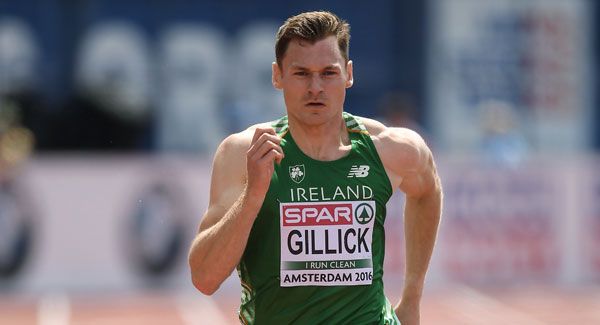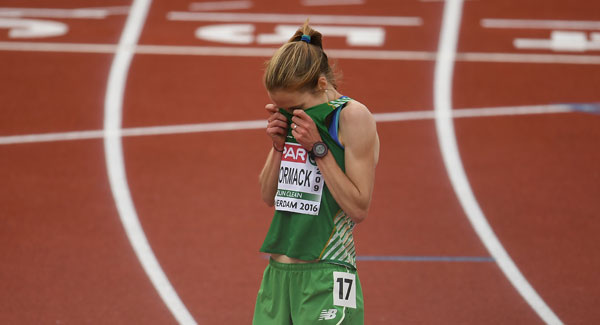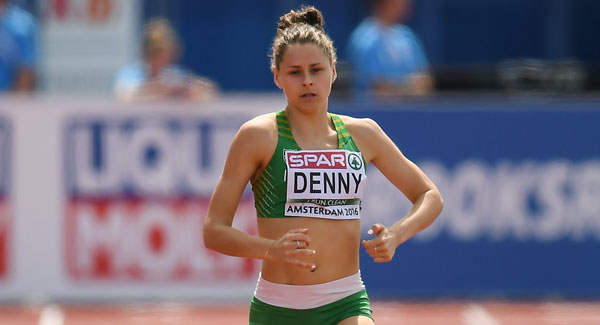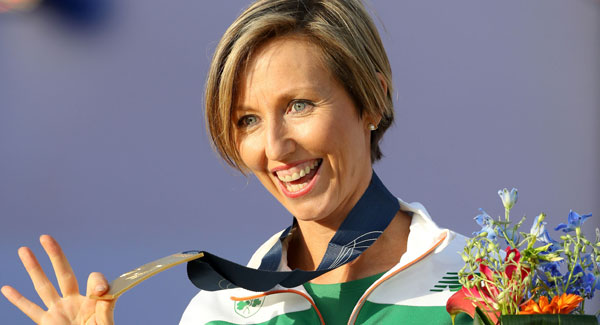By Will Downing, Amsterdam
David Gillick has kept alive the possibility of taking a place in the 4x400m relay squad for Rio at the European Athletics Championships in Amsterdam.
“It gives me a chance to leave finally on my terms,” Gillick said after his race, still with a hope of being an Olympian once more.
Fionnuala Britton finished an agonizing fourth in the women’s 10,000m final on the opening day of the European Athletics Championships in Amsterdam, as Thomas Barr, Brian Gregan and Sinead Denny all qualified for semi-finals.

But Olive Loughnane did receive her rightful gold medal for the 2009 World Championship walk title denied her that day seven years ago by the subsequently-banned Olga Kaniskina Britton missed out on a medal at the Olympic Stadium by seven seconds, but was still a second away from a lifetime best over a distance where she also took fourth place at the 2012 Europeans in Helsinki.
The field was decimated by Turkish athlete Yasemin Can, who switched from her native Kenya in March of this year, clocking a new European U23 record of 31 minutes, 12.86 seconds – breaking her old mark from May of 31:30.58 by a whopping 18 seconds, a time that is also a European lead for the season.
A lead of 60 metres was opened up very early by Can, with large gaps left in her wake.
McCormack showed welcome bursts of speed every couple of laps to move her up the rankings, leaving her third at one stage, but with three laps to go, the ultimate final positions were determined, with the double European cross-country champion’s threat of being able to reign in Norwegian Karoline Grovdal denied.
Portuguese veterans Dulce Félix and Sara Moreira were leading the chase for a long time, only for Moreira to drop out in the closing lap, while Félix took the race to the Turkish athlete, losing out in the end by six seconds.
Grovdahl was third, four seconds down on Félix, with McCormack a further seven seconds behind the Norwegian.
McCormack was unsure of her emotion after the race: “It’s frustrating to be fourth and yet the positives are I am in PB shape in an event I am not focusing on in the summer.

“The fact I had to be in PB shape to finish fourth surprised me a little bit. It’s the way the race ended up. It was an honest race. It would have been a lot more frustrating to have come fourth waiting to sit and kick.
“It’s good to get out there and run like that. When I finished, I knew I had done everything I could.”
Tara Jameson was 14th.
Barr put an injury-hit season behind him to win his opening round heat of the men’s 400m hurdles quite emphatically, having trailed on the final bend behind Estonian Jaak-Heinrich Jagor with 100 metres to go.
But the Waterford hurdler put on his famous closing-straight thrusters to blitz the field and win his heat in a solid 50.17 seconds.
“It puts me back in there,” Barr said after his victory. It puts me back in the mix of where I should be and where I want to be. Three weeks ago, we weren’t sure if I was even going to be here. Two weeks ago, even.
“It was looking like the Olympic dream was going down the pan so I’m glad to be back out there running and qualifying for the semi-final, just like last time two years ago.”
Sinead Denny was the day’s other automatic qualifier for Ireland, coming third in her heat of the women’s 400m, clocking 53.95 behind race winner Lisanne de Witte of hosts the Netherlands.
The DSD athlete’s time was 0.70 outside her lifetime best, which she is aiming to break in the semis tomorrow.
Denny’s goals: “I hopefully will get a decent lane with automatic qualification, stick to the girl outside me and hopefully come away with a PB!”

Brian Gregan needed to sweat a little, but still progressed as a fastest loser to the men’s 400m semi-finals.
His time of 47.02 seconds took fifth in his heat out of lane one, where only the top four would automatically progress., but it did mark him out as the second next-best.
“I’m through, but difficult being in lane one,” Gregan admitted afterwards. I felt very good. I just pipped for that final automatic qualifying spot. Perhaps it was a bit of naiveté by myself.
“I felt comfortable enough, but I was pipped by lane eight. I couldn’t look across.”
The others in the 400m succumbed, including double European 400m indoor champion David Gillick, who came out of retirement three years after hanging up his spikes, qualifying for Amsterdam, and keeping alive the possibility of taking a place in the 4x400m relay squad for Rio.
“It gives me a chance to leave finally on my terms,” Gillick said afterwards, still with a hope of being an Olympian once more. “We have a good crop of lads. We’ve just got to negotiate the individuals first.”
Craig Lynch was seventh in his heat, while US-based Naas AC athlete Claire Mooney finished in sixth place in her shot at the women’s 400m.
Also eliminated were Paul Byrne in the men’s 400m hurdles, Siofra Cleirigh-Buttner – fifth in the women’s 800m heats and for a long time hanging on a fastest loser – and Tomás Cotter, twelfth in his semi-final of the men’s 3000m steeplechase.
Olive Loughnane finally received her long-awaited gold medal for winning the 2009 World Championships women’s 20k walk, having finished second in Berlin behind Russian Kaniskina, who was banned last year and had her results quashed.

IAAF President Seb Coe and European Athletics president Svein Arne Hansen presented Loughnane with her new gold, to go with the original silver from 2009 that has not been taken back.
“It was worth the wait. It’s good to be here,” said Loughnane at the Victory Plaza in Amsterdam. I’m looking forward to celebrate with my family and friends and all the people, a lot of who were in Berlin.
“The athletics family have gone as far as they can go to replicate what should have happened on the night, and I really appreciate that.”


